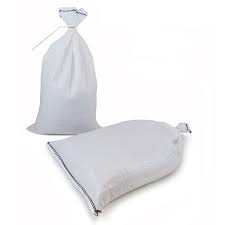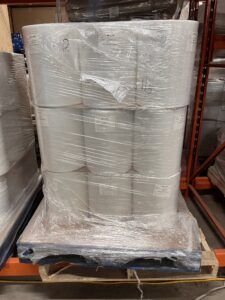In the agricultural and produce-packing world, efficiency, affordability, and durability are keys to success.
Poly bags—crafted from tough yet lightweight polypropylene material—are revolutionizing how farmers package, transport, and store dry goods like seeds and grains.
Known for their durability and cost-effectiveness, these bags meet diverse needs and can be bought in bulk affordably, while standing up to harsh farming environments well. In this article, we’ll explore how polypropylene bags, woven polypropylene bags, and similar packaging products streamline how farmers handle their operations more effectively.
What Are Polypropylene Bags?

Polywoven bags, often called woven polypropylene bags, are constructed by weaving plastic polymer threads together. This method produces a robust yet flexible material with tear resistance and a very small weave, making these bags perfect for carrying and storing heavy but fine loads like seeds, grain, and sand.
Key Features
- Durable material designed for demanding tasks
- More breathable than non-woven solid plastic bags
- Lightweight yet tear-resistant
- Affordable and available for immediate delivery
What Are Polywoven Bags Used For?
Plastic bags have a variety of industrial applications. In the case of woven bags, even though they’re extremely versatile, they’re mainly used in the agricultural industry. Why and for what?
- Seed Storage: For farmers, moisture and pests are persistent threats. A polypropylene bag can protect seeds for months, or longer.
- Grain Packaging: Woven bulk bags help grain farmers transport and store harvests securely. Their tear resistance and capacity for bulk packaging reduce product losses.
- Animal Feed Transport: Farmers delivering animal feed rely on the durability and quality of these bags, which are tight enough to prevent contamination and spillage.
- Sandbags for Protection: Even if burlap bags are sometimes preferred for sand bag or erosion protection, the agricultural industry also uses polypropylene bags for flood defense.
Why use Woven Polypropylene Bags

Let’s jump straight into what makes these specific bags stand out over others.
Practical Advantages
- Moisture Resistance: Moisture can ruin grains or sprout seeds prematurely. Many polypropylene bags are laminated or equipped with liners to keep products dry, even in humid conditions.
- UV Resistance: Exposure to sunlight during transportation is no longer a problem with UV-treated polywoven bags, which preserve product quality under outdoor conditions.
- Pest Deterrence: The tightly woven design acts as a barrier against pests.
- Low Cost: Compared to alternatives like canvas or jute, pp woven bags are economical. Their mass production keeps costs low without sacrificing durability or quality.
- Reusability: In some cases, farmers appreciate the ability to reuse woven bags multiple times. Proper care and storage extend the life of these bags, reducing the need for frequent replacements.
Sustainable Practices
Sustainability is more important than ever in modern agriculture (and particularly for us bulk bag suppliers in Canada). Fortunately, woven polypropylene bags align with eco-conscious farming practices.
- Recyclability: Polypropylene can be recyclable, making these bags an environmentally friendly choice.
- Efficiency in Use: Thanks to their durability and reusability, fewer resources are needed to produce replacements. This can help to lower the overall environmental footprint of farming operations.
- Breathable Options: Many polywoven bags are designed to be breathable, preventing condensation buildup while maintaining product freshness.
Practical Tips for Using Polywoven Bags
While it’s true that these bags are recyclable, these tips make their usable life even longer.
1. Store Correctly
Keep unused bags in a cool, dry place away from direct sunlight to prevent degradation.
2. Follow Weight Specifications
Adhere to the recommended weight capacities for each bag size to prevent over-stressing the woven material. This avoids tears and maintains the tear-resistant properties of the bags.
3. Inspect Before Use
Check each bag for signs of wear, damage, or weakening before reusing them. Small tears or compromised areas can lead to spills, moisture exposure, or contamination during transport.
4. Check for Proper Sealing
For products requiring extra protection, such as seeds or grains, use polywoven bags with drawstring closures or sealing mechanisms to enhance protection against moisture and pests.
5. Label for Organization
Use labels or markers to identify the contents of each bag, especially in bulk storage. Clear labeling makes for easy inventory management and prevents mix-ups during transport or use.
6. Avoid Dragging
While polypropylene bags are durable, dragging them across rough surfaces can wear down their outer layers. Always lift or carry bags to prevent unnecessary damage.
7. Clean and Reuse
If the bags are intended for reuse, clean them thoroughly after each use to remove residual dirt, moisture, or contaminants. This helps maintain the bags’ quality for future applications.
8. Recycle Responsibly
When a polywoven bag reaches the end of its usable life, recycle it at an appropriate facility. Most polypropylene materials are recyclable, reducing waste and supporting sustainable farming practices.
Check Out St Boniface’s Bulk Polywoven Bags––Call Now!
Here at St Boniface Bags we sell over a dozen types of bags. In fact, selling bags in bulk and bags online is all we do!
So what makes our polywoven bags unique? Well, apart from the fact that you can get a discount if you order 1000+ bags, or the fact that we work with farmers and end-users of all kinds for compelling free quotes, we also offer a huge range of bag sizes. Order online or give us a call to learn more and get a bulk quote today!



